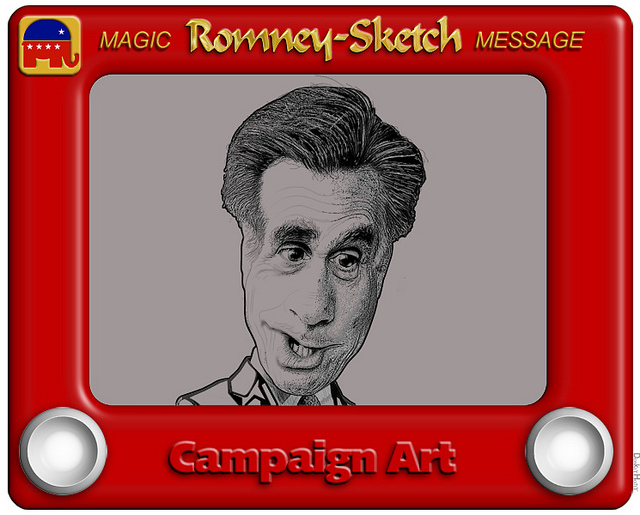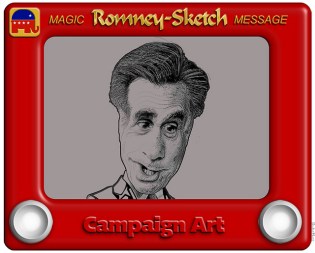Cross-posted from Climate Progress.
These days, Mitt Romney falsely accuses Obama of wanting “to see gasoline prices go up.” But back in 2006, it was Romney who championed high gasoline prices. He opposed a reduction in the state gas tax by arguing, “I’m not sure there will be the right time for us to encourage the use of more gasoline.”
Ironically, Mitt Romney is in damage control mode after one of his top campaign spokesmen compared the candidate’s stance on issues to an Etch A Sketch yesterday.
“I think you hit a reset button for the fall campaign,” said campaign adviser Eric Fehrnstrom on CNN yesterday morning. “Everything changes. It’s almost like an Etch A Sketch. You can kind of shake it up and we start all over again.”
The comments illustrate what conservative Republicans fear and what the Democratic opposition is celebrating: The candidate’s stances have changed so dramatically, it’s nearly impossible to know who the real Romney is.
The latest Etch A Sketch moment for the campaign relates to gas prices. In 2006, saying he didn’t think high gas prices would go away, Romney pushed for alternatives to petroleum fuels. When Romney came into office, his administration even proposed quintupling a fee on wholesale fuel deliveries in order to fund environmental clean up.
Alec MacGillis of the New Republic had a piece this morning on Romney’s old gas policies:
Governor Romney responded to price spikes by describing them as the natural result of global market pressures and by calling for increases in fuel efficiency — the same approach that he now derides Obama for taking as president.
At moments, Romney went so far as to make high gas prices out to be a welcome reality for the foreseeable future, one that people needed to learn to live with. When lieutenant governor Kerry Healey, a fellow Republican, called for suspending the state’s 23.5 cent gas tax during a price spike in May 2006, Romney rejected the idea, saying it would only further drive up gasoline consumption. “I don’t think that now is the time, and I’m not sure there will be the right time for us to encourage the use of more gasoline,” Romney said, according to the Quincy Patriot Ledger’s report at the time. “I’m very much in favor of people recognizing that these high gasoline prices are probably here to stay.”
Romney aggressively supported “smart growth” policies to promote public transportation, walkable cities, and next-generation vehicles. Today, conservatives like Glenn Beck and Rush Limbaugh call smart growth a liberal U.N. plot to increase government control over people’s lives.
During the 2012 campaign season, Romney has jumped headfirst into the political gamesmanship over gas prices, completely switching his previous stances on how to deal with our dependence on petroleum-based fuels. Even while admitting in 2006 that prices would continue to climb, Romney is now saying that “there’s no question” the Obama administration is responsible for the spike in prices.
Of course, the president is not responsible for high gas prices. And that completely bogus claim has been repeatedly debunked by the Wall Street Journal and the conservative Cato Institute.
Romney has called for nothing but a “drill baby drill” approach to lowering gas prices — even though multiple analyses, including a recent investigation by the Associated Press, have found absolutely no correlation between increased drilling and lower gas prices over the decades.
In 2006, Romney believed efficiency, public transportation, and alternatives to oil were the key to alleviating consumer pain at the pump. Today, he calls those options “illusory.”
“I’m running as a conservative Republican,” said Romney, in response to the Etch A Sketch comment. “I was a conservative governor. I will be running as a conservative Republican nominee — hopefully, nominee at that point. The policies and the positions are the same.”
But that’s the trouble for Romney. His policies and positions aren’t anything close to the same.



